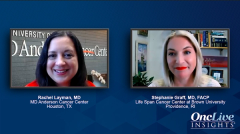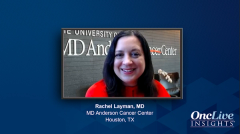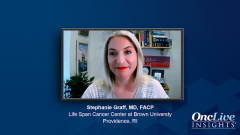
Impact of Trial Data on Clinical Practice
Expert medical oncologists talk about the impact of NATALEE trial data on their medical practice.
Episodes in this series

Transcript:
Rachel Layman, MD: If you were seeing her today, would you…
Stephanie Graff, MD, FACP: … In a world where the FDA does not exist?
Rachel Layman, MD: Right. What would you do?
Stephanie Graff, MD, FACP: If she’s eligible for NATALEE [NCT03701334], I absolutely would talk to her. There is a planned stage 3B, like a postapproval, hopefully—a trial called WIDER [NCT05827081] that’s in the works that I will have at my institution [Life Span Cancer Center at Brown University, Providence, Rhode Island], so I would probably be talking to her about the WIDER study, considering her for adjuvant ribociclib [Kisqali] in that setting. But I would be saying, “Listen, there [were these] data that [were] presented; patients like you seem to benefit from the addition of this drug. I don’t have it today [so] that I can write it for you. But I’d love for you to come back in 6 to 8 weeks when you’re done with radiation [and] in 3 months at your first follow-up appointment, we’re going to talk then.”
And, in truth, that is actually what I’ve been telling patients in the time since I’ve been back from ASCO [American Society of Clinical Oncology Annual Meeting] [who] fall into that population. I think we’re all just waiting to see what happens. And this is something that you as the patient and [I] as the clinician need to be discussing and thinking through and deciding what the right thing is. We’re still in that shared decision-making space as we wait for the data to mature. But I think it’s important to start having those conversations.
Rachel Layman, MD: Yes, I agree. And we will also be having the WIDER clinical trial, so I’m still fortunate to be able to offer that, whereas not every institution will be able to do that. I think that if that wasn’t an option, one could consider doing abemaciclib [Verzenio] instead. We would be in this shared decision-making stage of that, because she would fall more into cohort 2 where the data [are not] as mature and it was a much smaller patient population. She would have met the ASCO guidelines to receive abemaciclib, but not the FDA or NCCN [National Comprehensive Cancer Network] guidelines. I think at least having that discussion if she was not able to get access to ribociclib could be an idea.
Transcript edited for clarity.






































